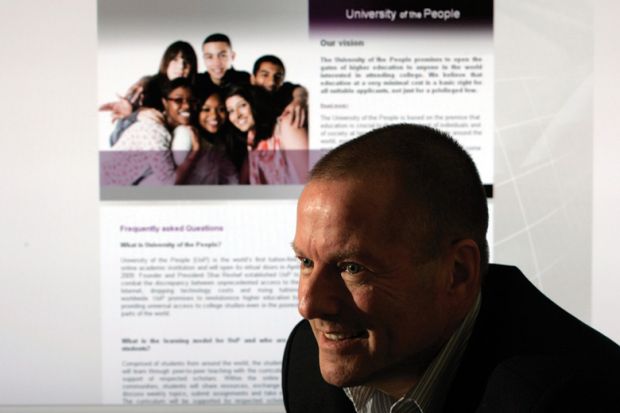At first glance Shai Reshef could be any other millionaire businessman. Sitting on the plush, white leather seats in the afternoon tea room at London’s Langham Hotel, he orders a green tea with lemon while a pianist plays Für Elise.
But Mr Reshef is no ordinary entrepreneur. Six years ago he invested $3 million (£2.1 million) of his own money to launch the University of the People (UoPeople) – a free online university aimed at disadvantaged students from around the world.
When he was interviewed by Times Higher Education in 2013, the university had 1,600 students. Mr Reshef tells me that there are now 3,000, but this will reach 4,000 later this year, at which point the institution will become financially sustainable. In 2014, the university also gained accreditation from the Distance Education and Training Council in the US.
Has this “stamp of approval”, as he called it, helped the university to become recognised as a quality provider of education among students and employers?
“People are quite certain about our quality,” he said. “Sixty per cent of our students say they got either an increased salary or promotion while studying with us.”
He added that the university is “blessed” to have the backing of New York University (NYU) president John Sexton and University of California, Berkeley chancellor Nicholas Dirks, both of whom serve on UoPeople’s Council of Presidents. NYU also has an agreement to identify UoPeople students eligible for admission to its Abu Dhabi campus, while Microsoft has promised to provide scholarships to 1,000 young people in Africa, who will also benefit from mentoring and training by the company.
“In many developing countries our quality of education is superior to what they find locally. But even when you look at the standard in the developed world, we’ve no reason to be shy on our quality,” he said.
For Mr Reshef, becoming financially sustainable is key – not only for the future of his organisation but also to show governments in developing countries and other universities that the model is successful and something that they could endorse and introduce as well.
“A lot of developing countries’ governments are trying to build their Oxford or Harvard and the few millions they have they spend on building these institutions. A few years go by and it’s not [become] Oxford because you don’t build Oxford in a few years or with a few million,” he said.
“What we say is look at what we’ve done. With the same amount of money you could educate every single person in your country.”
Three years ago, the Nigerian government signed an agreement with the university to provide scholarships for 500 students. When I bring this up Mr Reshef goes silent. “It never happened. What can I say,” he said. “I’m still willing to do it, even tomorrow. But they haven’t sent the students.”
Mr Reshef has previously claimed that he is not concerned about the potential competition from Moocs (massive open online courses), arguing that his students get personalised attention because of small class sizes.
So how does he think the higher education landscape will look in 10 years’ time?
“I think that in 10 years’ time the majority of qualified people will have an opportunity for higher education,” he said.
“There will be cheap and expensive universities. But there will also be different offerings. Some will be like they are now – face-to-face. Some will be like us, fully online. Some will be hybrid.
“I can envisage a situation where there will be a real virtual classroom where a professor and 20 students all see each other virtually, maybe in 3D.
“It’s not that those [universities] that exist right now won’t exist but they will be a much smaller [proportion of higher education].”
This evolution of higher education, he said, will mean that other universities will emulate his model – in which tuition is free but students pay $100 for each exam they sit – but he suggested that this may happen only “when they see they have no other choice”.
“Why would anyone pay 10 times more for an institution that does not necessarily deliver a higher quality degree? That institution either will have to change its price structure or its offering but it can’t continue doing the same thing, because the students won’t go there,” he said.
“It will take time and they will do it only when they see they have no other choice – when either they change or they have to close down.”
He said that he recently contacted the 4,000 volunteering professors at UoPeople, to ask if anyone was available to teach a course. In one week, 800 professors expressed their interest.
“They all come to us because they want us to succeed,” he said. “They want education to be open. They want it to be less expensive. They look at the price that their own institutions charge, and they want it to be different.”
POSTSCRIPT:
Print headline: University of the People – others ‘will emulate model’
Register to continue
Why register?
- Registration is free and only takes a moment
- Once registered, you can read 3 articles a month
- Sign up for our newsletter
Subscribe
Or subscribe for unlimited access to:
- Unlimited access to news, views, insights & reviews
- Digital editions
- Digital access to THE’s university and college rankings analysis
Already registered or a current subscriber? Login







